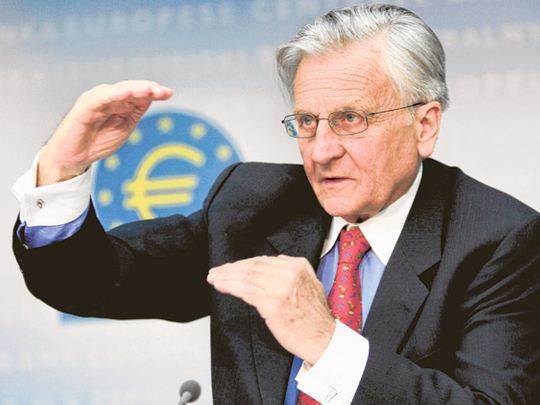
Frankfurt: By declaring it is "essential" to avoid broad-based pressure for inflation and raising its overnight deposit rate as well as its key refi rate, the European Central Bank signalled it will act aggressively if necessary this year to head off an extended rise of inflation.
At his news conference after the ECB hiked the refinancing rate by 25 basis points from a record-low level of 1 per cent yesterday, President Jean-Claude Trichet had the opportunity to dampen market expectations for more rate rises this year.
He did say the ECB had not decided its hike would be the first in a series — an assurance to nervous markets that the central bank would weigh each month's rate decision carefully.
But the Governing Council meeting was in any case very unlikely to agree in advance on a string of hikes.
By stressing the importance of avoiding an inflationary spiral, saying the medium-term risks were for higher inflation, and attributing inflation pressure to strong growth in emerging economies as well as high oil prices, Trichet made clear where the ECB's priorities will lie this year.
Vigil
"We will continue to monitor very closely all developments with respect to upside risks to price stability," he said. This was slightly less hawkish in tone than Trichet's remark last month that he would adopt "strong vigilance" against inflation, which markets saw as indicating an imminent rate hike, but the inclusion of the word "very" showed continued concern.
So markets will continue to view yesterday's hike, the first since July 2008, as the beginning of a series of rate rises extending at last through the end of this year.
Portugal's decision on Wednesday night to seek an international bailout has probably made it easier for the ECB to tighten policy in coming months, since the bailout will give Lisbon relatively low-cost financing as market rates rise.
Before yesterday's rate hike, EONIA overnight rates implied a rise in the refi rate to 1.75 per cent by the end of this year. After the decision, they were barely changed.
Also important was the ECB's decision yesterday to raise the overnight deposit rate, which acts as a floor for short-term market rates, by 25 basis points to 0.50 per cent.
Forecast
About half of economists surveyed by Reuters had expected the ECB to leave the deposit rate at 0.25 per cent, widening the corridor between it and the refi rate back to its traditional, pre-crisis size of 1 percentage point.
The central bank's hike of the deposit rate suggests it is not willing to sit back and wait for market rates to return to normal levels above the refi rate as commercial banks gradually reduce their intake of ECB loans. Instead, the ECB wants to reassert some control over market rates and dictate the pace at which they rebound from ultra-low levels. However, Trichet did not reveal when or how the ECB would take a key step towards returning market rates to normal levels: phasing out its offers of unlimited loans to banks in money market operations.
The loans were introduced as an emergency step but have now become a liability, putting massive downward pressure on rates.
Last month, euro zone official sources told Reuters that the ECB was close to creating a new liquidity facility that would support weak banks in Ireland and elsewhere, helping it eventually to phase out unlimited loans. But disagreements within the ECB's Governing Council over how much aid the central bank should provide to countries have caused that plan to be suspended.
CURRENCY and GROWTH
The fact that Trichet did not express concern about the strong euro, which has been hitting 14-month highs against the dollar, was striking.
He said one of the upside risks for economic growth was exports, implying he felt they could withstand euro strength, and did not list currency appreciation as one of the downside risks to economic expansion. Although $1.40 has been seen by some as a pain level for manufacturers, the strong euro helps curb commodity price inflation, which probably accounts for Trichet's acceptance of currency levels. This suggests the euro might have to rise to $1.50, before the ECB is concerned.












